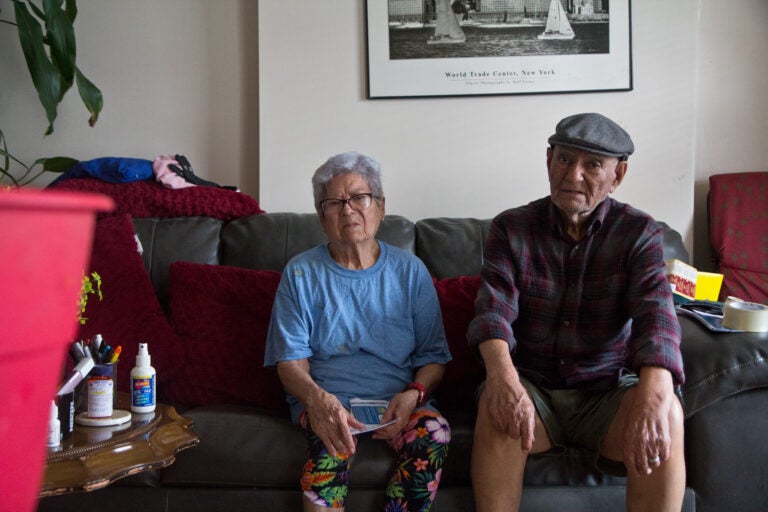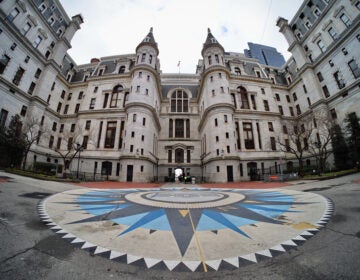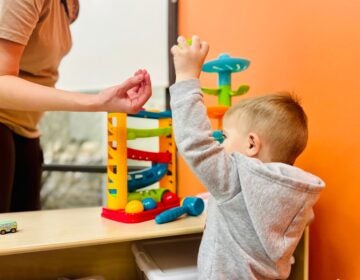New dilemma for Philly residents with no AC
In Philly, the same people vulnerable to COVID-19 are also vulnerable to extreme heat. That means they have a difficult choice to make: escape the heat or avoid the virus?
Listen 16:27
Gloria and Hugo Nievas just bought an air conditioner to install in their home in Hunting Park, one of Philiadelphia's hottest neighborhoods. (Kimberly Paynter/WHYY)
As Philly faced its first heat health emergency of the summer this week, the same residents who are vulnerable to COVID-19 are also vulnerable to extreme heat. Many live in homes without air conditioning units and can’t afford to buy them.
Catalina Jaramillo of WHYY’s PlanPhilly explains how the pandemic has changed some of the ways the city offers cooling relief and led to conflicting public health messages. That’s presented residents with a difficult choice to make and risks to weigh — escape the heat or avoid COVID-19.
Catalina has the story of how one couple faced such a dilemma.

Hear the whole story on The Why
Interview highlights
On how Philly has reduced heat-related deaths
In the ’90s, more than 350 people died from the heat. But that has been getting better because the city has been implementing mitigation, adaptation plans that have helped.
So in 1995, the city established this kind of like health and heat alert. And when the city declares a heat emergency, it activates a series of services and responses. One of them is opening cooling centers, which are air conditioning spaces where people can go. And they extend the hours of those centers so people can stay there longer. Another thing is the heat line number that people can call and say, like, “I’m feeling exhausted” … and then they get nurses talking with them. If the nurse at that moment recognizes that you’re having a problem, they can send nurses to go to your house and check your vitals. There’s also something that’s called a “code red,” which basically the Office of [Homeless Services] increases their outreach. And if you see someone on the street, you can call a number so that someone comes and check on them …
In the last eight years, just over 30 people have died from heat. So if you can put that to the 90s, that’s a huge improvement. And I have to say that this is something that Philadelphia took like a frontline in doing and a lot of other cities replicate.
On the confusing public health message around heat and COVID-19
Because of COVID, most of the places where people would go to cool off, like libraries or senior centers or rec centers or public pools, they’re all closed. So the city’s recommendation for people without air conditioning was to actually go and visit a neighbor or a friend or a family member who has air conditioning …
It’s a little bit of a double message because you’re saying [to] people stay at home, but then you’re saying go to your neighbor or your friend if you don’t have AC.
The way that New York City solve[d] this kind of like, conundrum … between COVID and heat was that they had a heat plan that incorporated all the uncertainties and health issues that COVID brought. So what they did is they raised funds to create a program to give AC units for seniors, for the people who are more vulnerable, so they didn’t have to come out of their houses and they could stay there. They raised $55 million dollars from a few different government agencies to give away 74,000 AC units to low-income seniors.
Philly says they cannot do that because they cannot afford it. Their budget is in a real deep shortfall of $750 million. And they say they’re trying to get partners to help them to provide some kind of “cooling agent” as they call [it], but they haven’t said what.
On the response to Catalina’s story
I think people are very frustrated by the response of the city and after the story about the ACs and the Nievas [couple] … I got a lot of people offering donations of AC units, which I’ve been able to put into contact with Esperanza, which is an organization … helping people in Hunting Park, where [Gloria and Hugo Nievas] live.
 WHYY is one of over 20 news organizations producing Broke in Philly, a collaborative reporting project on solutions to poverty and the city’s push towards economic justice. Follow us at @BrokeInPhilly.
WHYY is one of over 20 news organizations producing Broke in Philly, a collaborative reporting project on solutions to poverty and the city’s push towards economic justice. Follow us at @BrokeInPhilly.
WHYY is your source for fact-based, in-depth journalism and information. As a nonprofit organization, we rely on financial support from readers like you. Please give today.






